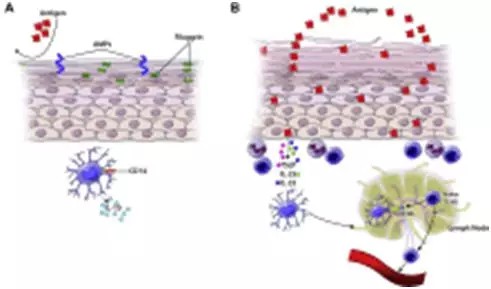JACI:细胞分子学层面对食物过敏和食物耐受的解释
发布日期:2018-11-13
原标题:食物过敏和食物耐受的细胞分子学机理


Allergy
https://doi.org/10.1016/j.jaci.2016.02.004
Abstract:
Ingestion of innocuous antigens, including food proteins, normally results in local and systemic immune nonresponsiveness in a process termed oral tolerance. Oral tolerance to food proteins is likely to be intimately linked to mechanisms that are responsible for gastrointestinal tolerance to large numbers of commensal microbes. Here we review our current understanding of the immune mechanisms responsible for oral tolerance and how perturbations in these mechanisms might promote the loss of oral tolerance and development of food allergies. Roles for the commensal microbiome in promoting oral tolerance and the association of intestinal dysbiosis with food allergy are discussed. Growing evidence supports cutaneous sensitization to food antigens as one possible mechanism leading to the failure to develop or loss of oral tolerance. A goal of immunotherapy for food allergies is to induce sustained desensitization or even true long-term oral tolerance to food allergens through mechanisms that might in part overlap with those associated with the development of natural oral tolerance.
First Author:
R. SharonChinthrajahMD.
Correspondence:
Kari C.NadeauMD, PhD
All Authors:
Joseph HernandezMD, PhD ∗Scott D.BoydMD, PhD Stephen J.Galli MD


——来自浙大迪迅
人体的免疫系统对摄入的无害抗原,包括食物蛋白,通常不会出现局部和全身免疫反应,这一过程被称为口服耐受。对食物蛋白的耐受性可能与胃肠道对大量共生微生物的耐受性机制密切相关。在这里,我们回顾了目前对食物耐受的免疫机制的理解,以及这些机制中出现的干扰如何促进食物耐受的丧失和食物过敏的发展。讨论了共生菌群在促进食物耐受中的作用以及肠道失调与食物过敏的关系。越来越多的证据支持皮肤对食物抗原的敏感性,认为这可能是导致耐受不能形成或耐受丧失的一种机制。对食物过敏进行免疫治疗的目标是通过一些机制诱导对食物过敏原的持续脱敏,甚至是产生真正的长期耐受性,这些机制可能在一定程度上与天然食物耐受性的形成相重叠。
延伸阅读

Allergy
[IF:13.1]
Molecular and cellular mechanisms of food allergy and food tolerancehttps://doi.org/10.1016/j.jaci.2016.02.004
Abstract:
Ingestion of innocuous antigens, including food proteins, normally results in local and systemic immune nonresponsiveness in a process termed oral tolerance. Oral tolerance to food proteins is likely to be intimately linked to mechanisms that are responsible for gastrointestinal tolerance to large numbers of commensal microbes. Here we review our current understanding of the immune mechanisms responsible for oral tolerance and how perturbations in these mechanisms might promote the loss of oral tolerance and development of food allergies. Roles for the commensal microbiome in promoting oral tolerance and the association of intestinal dysbiosis with food allergy are discussed. Growing evidence supports cutaneous sensitization to food antigens as one possible mechanism leading to the failure to develop or loss of oral tolerance. A goal of immunotherapy for food allergies is to induce sustained desensitization or even true long-term oral tolerance to food allergens through mechanisms that might in part overlap with those associated with the development of natural oral tolerance.
First Author:
R. SharonChinthrajahMD.
Correspondence:
Kari C.NadeauMD, PhD
All Authors:
Joseph HernandezMD, PhD ∗Scott D.BoydMD, PhD Stephen J.Galli MD
2018-11-5 Review
创建过敏性疾病的科研、科普知识交流平台,为过敏患者提供专业诊断、治疗、预防的共享平台。

开云电子(中国)官方网站 | 华亿首页(中国)网页版 | 开云网页版 | 天博手机网页(中国)有限公司 | 千亿体育线上平台中国有限公司 | 米兰手机在线登入 | 米乐官方网页版 | 华亿网页版 | 三亿体育首页(中国)网站首页 |
 华亿体育(中国)游戏平台
华亿体育(中国)游戏平台

